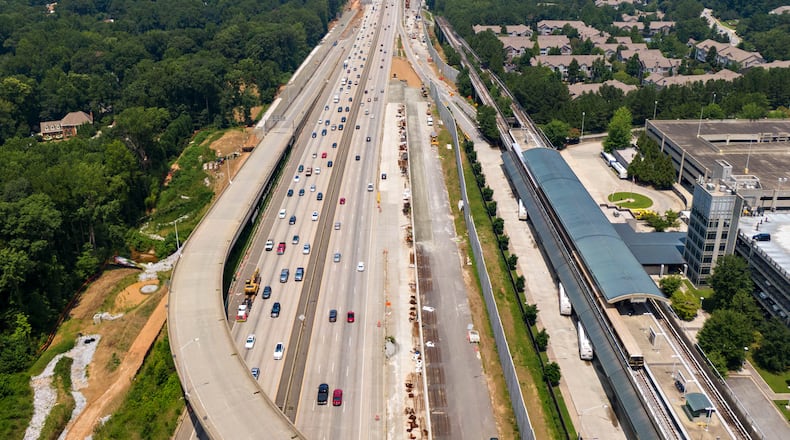The Georgia Department of Transportation has selected SR 400 Peach Partners to build and operate 16 miles of express lanes on Ga. 400, a decision that will allow the private company to collect tolls along the route for 50 years.
The State Transportation Board approved the choice Thursday, advancing a piece of GDOT’s goal of creating a system of connected express lanes throughout metro Atlanta. The long-delayed project, which at one point was slated for completion this year and now is not expected until 2031, is the first public-private partnership of its kind in Georgia.
Topping $4 billion, it’s also the most expensive project the state has ever pursued, though the terms of the deal mean taxpayers’ costs will be minimal.
“Doing something like this is not a small undertaking,” GDOT Chief Engineer Meg Pirkle told the board. “It is a long-term commitment.”
The deal will also expand transit opportunities on Ga. 400, providing lanes for MARTA and Xpress buses as well as funding for two stations to support MARTA’s planned bus rapid transit lines, or BRT.
The board also approved a contractor to build the new I-285 interchange at 1-20, a $1.2 billion project that is the state’s second most expensive ever. Legacy Infrastructure Contractors will be tasked with alleviating traffic at what’s currently the fifth-most congested bottleneck in the country.
Unlike the Ga. 400 express lanes, the I-20/I-285 interchange will be built traditionally, without private investment. That was originally the plan for the Ga. 400 project until an initial bid in 2021 came in that far exceeded the state’s $1.7 billion budget. State officials say that by turning over operations to Peach Partners, the express lanes can be built quicker and at a significantly lower cost to taxpayers.
“(It’s) far more than what we would have been able to do with our own funding,” Transportation Commissioner Russell McMurry told the board.
Three years since the initial bid, the costs to build the express lanes are even higher.
Two groups bid on the project, Peach Partners and Georgia Express Link Partners. Both groups represent a coalition of construction, engineering and financing partners. A third finalist backed out of the bidding process last year.
Peach Partners’ bid estimated the design and construction costs at $4.6 billion, compared to a $4.3 billion bid from Georgia Express Link. Ultimately, Peach Partners won out because the group offered a $4 billion concession payment to the state, $744 million more than Georgia Express Link.
The concession will be paid to the state in about a year, Pirkle said. In addition, roughly $900 million the state had set aside for subsidies won’t be needed, freeing it up for other projects.
The state’s costs on the Ga. 400 project will be limited to money already spent preparing the corridor for express lanes, including three bridge replacements, and $100 million in general obligation bonds that were allocated to help expand bus rapid transit in conjunction with MARTA.
McMurry said GDOT will retain oversight and ensure the project is built to specification and follows state standards. The contract also sets an upper limit on toll rates Peach Partners can charge.
“This is not privatization, where you turn something over to a company and they’ve got total control,” McMurry told The Atlanta Journal-Constitution in an interview.
GDOT plans to take a public-private partnership approach for 40 miles of toll lanes planned along the top half of I-285. The construction timeline on that project has also been pushed back in recent years.
Credit: Miguel Martinez
Credit: Miguel Martinez
Ga. 400 has tolled in the past. A 50-cent toll, which every driver had to pay, was scrapped in 2013.
The new toll lanes on Ga. 400 will work like other express lanes already open in the metro and will be optional for drivers to use. The first express lanes opened in 2011 on I-85 in Gwinnett County and are now included in segments of I-75 and I-575.
Ga. 400 will keep the same number of general purpose lanes and those will remain free. Drivers with a Peach Pass can use the express lanes to bypass congestion and will pay a toll rate that varies by segment based on the amount of traffic at a given time.
The goal is to guarantee traffic in the express lanes at 55 mph. If the lanes get backed up, Peach Partners is authorized to raise toll prices until congestion clears.
GDOT has estimated that the Ga. 400 express lanes will be 30% faster than the general lanes, and it’s expected to speed up traffic in the general lanes, too.
Credit: BOB ANDRES / AJC
Credit: BOB ANDRES / AJC
With a public-private partnership, there’s a delicate balancing act when it comes to toll pricing.
Tolls are what repay the company’s investment in construction and maintenance and ultimately affect a private company’s bottom line. Meanwhile, the state’s goal is simply to keep traffic moving.
McMurry said he thinks the terms of the contract will strike that balance. If Peach Partners charges too high a rate, drivers simply won’t opt into the express lanes.
The state has set a limit at up to $1.83 per mile, a rate that can double when traffic speeds fall below 55 mph.
Jannine Miller, who serves as GDOT’s planning director and the head of several other transit agencies, said in an interview that the new express lanes will expand transit opportunities on Ga. 400.
In peak hours, it can take the state’s Xpress commuter buses an hour to get through that stretch, Miller said. Express lanes are projected to cut that trip time by at least a third.
The toll lanes will start around the North Springs MARTA station, currently the northern-most point on the red line. Instead of extending the rail line, MARTA has determined rapid bus lines are the best way to continue service north, and has already sought grants to cover those costs. The state has also allocated $100 million in bonds to support BRT along Ga. 400.
As part of the deal, Peach Partners will contribute $26 million toward the cost of two MARTA stations that will be used for BRT, one at Holcomb Bridge Road and another at North Point Mall.
The BRT line will run up to the Windward Park and Ride lot.
In a statement, a MARTA spokeswoman said it was pleased to partner with the state on the project.
“Together we are expanding transit and supporting economic development throughout the region,” spokeswoman Stephany Fisher said.
About the Author
Keep Reading
The Latest
Featured





